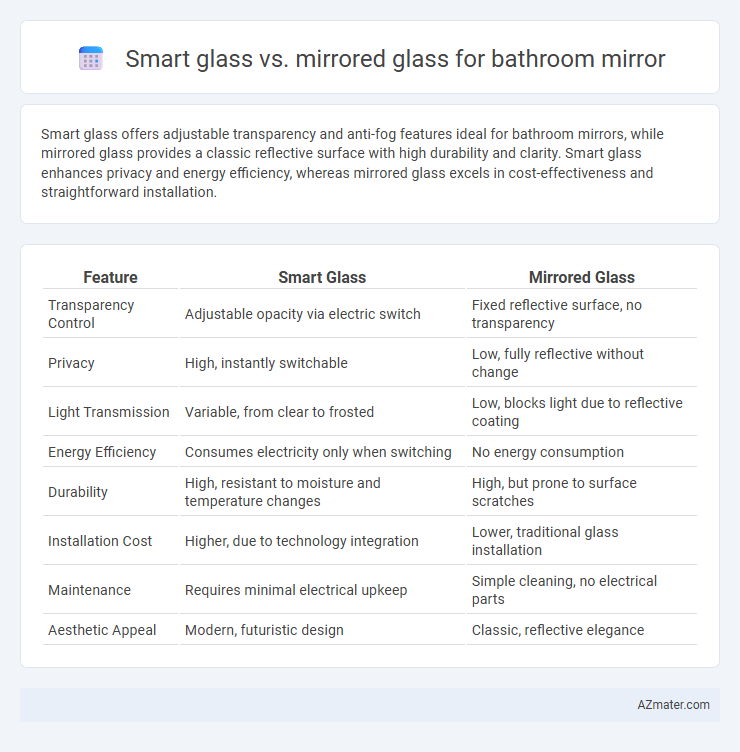Smart glass offers adjustable transparency and anti-fog features ideal for bathroom mirrors, while mirrored glass provides a classic reflective surface with high durability and clarity. Smart glass enhances privacy and energy efficiency, whereas mirrored glass excels in cost-effectiveness and straightforward installation.
Table of Comparison
| Feature | Smart Glass | Mirrored Glass |
|---|---|---|
| Transparency Control | Adjustable opacity via electric switch | Fixed reflective surface, no transparency |
| Privacy | High, instantly switchable | Low, fully reflective without change |
| Light Transmission | Variable, from clear to frosted | Low, blocks light due to reflective coating |
| Energy Efficiency | Consumes electricity only when switching | No energy consumption |
| Durability | High, resistant to moisture and temperature changes | High, but prone to surface scratches |
| Installation Cost | Higher, due to technology integration | Lower, traditional glass installation |
| Maintenance | Requires minimal electrical upkeep | Simple cleaning, no electrical parts |
| Aesthetic Appeal | Modern, futuristic design | Classic, reflective elegance |
Introduction to Bathroom Mirror Technologies
Smart glass technology for bathroom mirrors integrates electrochromic or photochromic materials, allowing users to adjust transparency and privacy with ease, enhancing both functionality and aesthetics. Mirrored glass remains a traditional choice, offering high reflectivity with options for anti-fog coatings to maintain clarity in humid environments. Innovative bathroom mirror technologies now combine smart glass features with energy-efficient LED lighting and touch controls, revolutionizing personal grooming experiences.
What is Smart Glass?
Smart glass, also known as switchable glass, is a high-tech material that changes its transparency or opacity when an electric current or heat is applied, providing privacy and light control in bathroom mirrors. It uses technologies such as liquid crystal, electrochromic, or suspended particle devices to adjust from clear to frosted instantly, enhancing functionality and aesthetic appeal. Compared to traditional mirrored glass, smart glass offers customizable privacy and energy efficiency by modulating natural light and reducing glare.
What is Mirrored Glass?
Mirrored glass is a type of glass coated with a reflective material, typically silver or aluminum, creating a highly reflective surface ideal for bathroom mirrors. It provides clear and accurate reflections, enhancing bathroom aesthetics and functionality while resisting moisture and corrosion. Unlike smart glass, mirrored glass does not offer privacy control or light modulation features but excels in clarity and durability.
Key Feature Comparison: Smart Glass vs Mirrored Glass
Smart glass for bathroom mirrors offers customizable opacity and integrated lighting control, enhancing privacy and ambiance with touch or app activation. Mirrored glass provides a clear, reflective surface with high durability and straightforward installation but lacks adjustable transparency or smart functionalities. Smart glass combines modern technology with multifunctional use, while mirrored glass delivers traditional reflection and robustness at a lower cost.
Privacy Considerations for Bathrooms
Smart glass offers advanced privacy control by switching between transparent and opaque states, allowing users to customize visibility instantly, which is ideal for bathrooms requiring adaptable privacy solutions. Mirrored glass provides constant privacy by reflecting the image back, but lacks the flexibility to change its transparency, potentially limiting its use in settings where adjustable privacy is desired. Smart glass technology enhances bathroom privacy by preventing visibility from the outside while maintaining light transmission, making it a superior choice for modern bathroom mirror installations focused on privacy.
Installation and Maintenance Differences
Smart glass bathroom mirrors require professional installation due to integrated electronic components and wiring for touch or motion sensors, whereas mirrored glass can be installed with standard mounting hardware by most DIY enthusiasts. Maintenance of smart glass mirrors involves careful cleaning of electronic surfaces to prevent damage, avoiding abrasive materials, while mirrored glass only needs regular wiping with glass cleaner to remove fingerprints and moisture. Smart glass mirrors may also require occasional software updates or electrical inspections, unlike traditional mirrored glass which has minimal upkeep.
Cost Analysis: Smart Glass vs Mirrored Glass
Smart glass for bathroom mirrors typically commands a higher initial investment, with prices ranging from $150 to $300 per square foot, compared to mirrored glass, which averages $30 to $60 per square foot. The cost difference stems from smart glass's integrated technology, such as switchable opacity and anti-fog features, which may reduce maintenance and enhance energy efficiency over time. While mirrored glass offers a budget-friendly option, smart glass provides long-term value through innovation and enhanced functionality.
Design Flexibility and Aesthetic Appeal
Smart glass offers superior design flexibility for bathroom mirrors by allowing customizable opacity levels, enabling seamless transitions between clear and frosted states that enhance privacy and modern aesthetics. Mirrored glass provides a classic reflective surface with a sleek, polished appearance ideal for minimalist or traditional bathroom designs but lacks dynamic functionality. Combining smart glass technology with mirrored finishes creates sophisticated, multifunctional mirrors that elevate both the aesthetic appeal and practical use of bathroom spaces.
Energy Efficiency and Sustainability
Smart glass for bathroom mirrors offers superior energy efficiency by dynamically controlling light transmission, reducing reliance on artificial lighting and minimizing heat transfer, which helps maintain room temperature and lower HVAC energy consumption. Mirrored glass, while reflective and aesthetic, lacks the adaptive properties of smart glass, resulting in higher energy use due to constant lighting needs and less insulation capability. The sustainability aspect of smart glass is enhanced by its potential to reduce overall energy demand and extend the lifespan of bathroom fixtures through integrated technology, whereas mirrored glass relies on traditional manufacturing with limited energy-saving benefits.
Choosing the Right Glass for Your Bathroom
Smart glass offers adjustable opacity, enhancing privacy and light control in bathroom mirrors, making it ideal for modern, tech-savvy spaces. Mirrored glass provides clear reflections and a classic aesthetic, often more affordable and easier to maintain. Choosing the right glass depends on your preference for functionality versus style, privacy needs, and budget constraints.

Infographic: Smart glass vs Mirrored glass for Bathroom mirror
 azmater.com
azmater.com